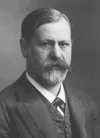Freud 1925g 超越唯乐原则
BEYOND THE PLEASURE PRINCIPLE
第一章
In the theory of psychoanalysis we have no hesitation in assuming that the course taken by mental events is automatically regulated by the pleasure principle. We believe, that is to say, that the course of those events is invariably set in motion by an unpleasurable tension, and that it takes a direction such that its final outcome coincides with a lowering of that tension - that is, with an avoidance of unpleasure or a production of pleasure. In taking that course into account in our consideration of the mental processes which are the subject of our study, we are introducing an ‘economic’ point of view into our work; and if,in describing those processes, we try to estimate this ‘economic’ factor in addition to the ‘topographical’ and ‘dynamic’ ones, we shall, I think, be giving the most complete description of them of which we can at present conceive, and one which deserves to be distinguished by the term ‘metapsychological’.
在精神分析理论中,我们十分肯定地认为,唯乐原则(the pleasure principle)自动调节着心理事件的过程。也就是说,我们相信这些心理事件的过程必定是由某种不愉快的张力启动的,而且,该过程引领之方向的最终结果就是消除这种紧张状态,即,避免不愉快或制造不愉快。我们在思考心理过程的研究项目时也纳入了上述过程,我们在工作中引入了“经济学(economic)”观点。而且,如果在描述上述心理过程时,我们除了评估“地形学(topographical)”和“动力学的(dynamic)”因素之外,还需要评估这个“经济学”因素,我认为,以上是迄今为之我们对以上心理过程所能给予的最完整的描述,以上描述需要用元心理学(metapsychological)一词加以区分。❶
It is of no concern to us in this connection to enquire how far, with this hypothesis of the pleasure principle, we have approached or adopted any particular, historically established, philosophical system. We have arrived at these speculative assumptions in an attempt to describe and to account for the facts of daily observation in our field of study. Priority and originality are not among the aims that psycho-analytic work sets itself; and the impressions that underlie the hypothesis of the pleasure principle are so obvious that they can scarcely be overlooked. On the other hand we would readily express our gratitude to any philosophical or psychological theory which was able to inform us of the meaning of the feelings of pleasure and unpleasure which act so imperatively upon us.
But on this point we are, alas, offered nothing to our purpose. This is the most obscure and inaccessible region of the mind, and, since we cannot avoid contact with it, the least rigid hypothesis, it seems to me, will be the best. We have decided to relate pleasure and unpleasure to the quantity of excitation that is present in the mind but is not in any way ‘bound’; and to relate them in such a manner that unpleasure corresponds to an increase in the quantity of excitation and pleasure to a diminution.What we are implying by this is not a simple relation between the strength of the feelings of pleasure and unpleasure and the corresponding modifications in the quantity of excitation; least of all - in view of all we have been taught by psycho-physiology - are we suggesting any directly proportional ratio: the factor that determines the feeling is probably the amount of increase or diminution in the quantity of excitation in a given period of time.Experiment might possibly play a part here; but it is not advisable for us analysts to go into the problem further so long as our way is not pointed by quite definite observations。
我们并不关心唯乐原则的假设在多大程度接近或采纳了任何特定的、历史上业已被接受的哲学体系。我们通过试图描述和解释自己的研究领域中日常观察到的事实而获得这些思辨性的假设的。优先和独创性并不是精神分析工作为自己设定的目标;而且,构成唯乐原则假设的基础的那些印象如此明显,几乎不能被忽视。另一方面,我们也非常乐意对这样一些哲学理论和心理学理论表示感谢:这些理论能够让我们了解如此迫切行动的唯乐与不唯乐感受的含义。然而,遗憾的是,我们没有为我们的目标提供任何东西。这是最模糊、最令人费解的心理领域。既然我们不能回避对它的研究,那么在我看来,最不僵化的假设将成为最好的假设。我们已经决定把愉快和不愉快与那些存在于心智中又不被任何束缚的兴奋程度联系在一起❷。而且,联系的方式是:不愉快与兴奋量的增大相一致;而愉快则与兴奋量的减少相一致。我们进行这种联系并非暗示:愉快和不愉快情感的强烈程度与兴奋量的相应变化之间是一种简单的关系;鉴于从心理生理学那里得来的认识,我们根本不打算提出任何正比例关系:决定这种情感的因素可能是一般特定时间内兴奋量增加或减少的数量。这里,实验可能发挥了一定的作用,然而在我们分析学者看来,要是没有十分确定的观察事实的指引,深入地讨论这个问题是不合适的。❸
然而,我们不能继续对这样一个事实视而不见,那就是一个具有深刻洞察力的研究者费希纳(G. T. Fechner)关于愉快和不愉快问题所持的观点在一切主要方面均与精神分析研究迫使我们相信的观点一致。费希纳的论述见于他的一本小册子中。该书书名是《关于有机体产生史和发展史的几点想法》(1873年,第11部分,附录第94)。他说:“只要意识的冲动始终同愉快和不愉快保持着某种联系,那么我们也就能这样认为,愉快和不愉快与稳定和不稳定的状态之间存在着一种心理物理学的关系。这一认识为我打算在别处更详细地讨论的一个假设提供了基础。根据这个假设,每一种产生于意识阂限以上的心理物理运动,当它接近完全的稳定性并超出一定的限度后,就会相应地产生出愉快,而当它背离了完全的稳定性并超出一定限度后,就会相应地产生出不愉快。我们或许可把这两种限度称作愉快和不愉快的质的阈限。在这两种限度之间,存在着某种空白地带,即审美的平静状态……”❹
那些使我们相信唯乐原则主导心理生活的事实同样也可以用这样的假设来表达:心理器官竭力要使它自身存在的兴奋量尽可能保持在最低水平上,或者至少使这种兴奋量保持不变。这个假设不过是对唯乐原则的另一种表述方式。因为,如果心理器官的作用是要将兴奋量维持在低水平上,那么,任何打算增大这种兴奋量的东西肯定就会被看作是违反心理器官功能的东西,亦即不愉快的东西。从常性原则出发,必然会得出唯乐原则。其实,常性原则(principle of constancy)是从那些迫使我们采纳唯乐原则的事实中推论出来的。❺ 况且,一种更详尽的讨论还将表明,我们认为由心理器官产生的这种倾向也可作为费希纳的“寻求稳定性倾向”原则的一个特例。他已将愉快的情感和不愉快的情感同这个原则联系起来了。
但是必须指出,严格地说,唯乐原则支配着心理活动整个过程的观点是不正确的。如果确实存在着这样一种支配作用,那么绝大多数的心理过程就必定会伴随着愉快,或者说必定会导致愉快。然而,普遍的经验却与这种结论完全相悖。因此,我们至多只能说,在人心中存在着一种趋向于实现唯乐原则的强烈倾向,但是它受到其他一些力或因素的抵抗,以致最终产生的结果不可能总是与想求得愉快的倾向协调一致。我们不妨比较一下费希纳提到的类似论点(1873年,第90页):“某种倾向趋向于某个目标并不意味着这个目标已经达到;而总的说来,这个目标又只能近似地达到,所以……”
如果我们现在转而探究哪些因素能阻碍唯乐原则实现的问题,便会发现自己再次处在一个很有把握并且十分熟悉的领域里。在作出解答时,有大量的来自分析的经验可供我们支配。
第一个表明唯乐原则以这种方式被阻碍的例子是经常出现而为人们所熟知的。我们知道,唯乐原则属于心理器官活动特有的基本活动方式,但是从处身于外部世界众多困难之中的有机体的自我保存角度来看,这种唯乐原则从一开始就是收效甚微、甚至十分危险的原则。在自我的自我保存本能的影响下,唯实原则取代了唯乐原则。[6]
唯实原则并不是要放弃最终获得愉快的目的,而是要求和实行暂缓实现这种满足,要放弃许多实现这种满足的可能性,暂时容忍不愉快的存在,以此作为通向获得愉快的漫长而曲折的道路的一个中间步骤。但是,唯乐原则作为性本能的活动方式,长久而固执地存在着,而这些性本能又是极难“驯化”的,结果唯乐原则就是从这些本能出发,或者在自我本身中,经常挫败唯实原则,从总体上给有机体造成损害。
然而,用唯实原则来取代唯乐原则,显然只能解释少量的、并且不算是最强烈的不愉快的体验。在自我向更高度复合的组织发展时,在心理器官内部发生的冲突和矛盾中还可发现另一种也是经常出现的不愉快情感疏泄的状况。几乎心理器官具有的全部能量都来自其内部的本能冲动,但并非所有的本能冲动都有可能达到同一发展阶段。通常会一再发生这样的情形:个别的或部分的本能在其要求和目的方面与另一些能联合进入自我的包容性统一体内的本能不能协调一致,于是,前一类本能便通过压抑过程脱离了这个统一体,滞留在较低级的精神发展阶段上,因而一开始就失去了获得满足的可能性。如果这些本能后来通过迂回曲折的途径,艰难然而成功地得到了某种直接的或替代的满足(在被压抑的性本能身上很容易发生这类情况),那么,那个在其他场合本来会是一个获得愉快的机会的事件,在自我的感觉中,却是一种不愉快。由于旧的冲突以压抑而告终,一种新的违背唯乐原则的情况恰惜就在某些本能依据这个原则正力图寻求新的愉快时出现了。至于压抑使一种获得愉快的可能变成某种不愉快的根源时所依赖的那个过程的详细情况,人们还没有得到清楚的认识,或者说人们还未能给予清楚的表述。不过毫无疑问,所有神经症的不愉快都是属于这种性质的不愉快,即一种无法按愉快来感受的愉快。❼
以上指出的两种不愉快形成的根源还远远不足以用来说明我们感受到的大多数的不愉快体验。但就其余的那些体验而吉,我们似乎可以不无理由地断言,它们的存在并不与唯乐原则占优势这一情况相矛盾。我们所体验到的大多数不愉快都是知觉的不愉快。它可能是对末得到满足的本能所引起的压力的知觉,要不就是一种或者其本身就是痛苦的、或者会在心理器官中激起种种不愉快的期待的外部知觉。这种不愉快的期待即是指被心理器官所认识到的“危险”。对这种本能的要求和危险的威胁所作出的反应构成了心理器官的实际活动,因而就能在正确的方式下得到唯乐原则或对唯乐原则有所修改的唯实原则的指导。这样似乎就没有必要对唯乐原则作任何有重大影响的限制。然而,研究对外部危险所作的心理反应,正可以提供和提出一些与我们目前讨论的问题有关的新材料和新问题。
——————————————
❶ 请参阅《无意识》(1912e)第4节。
❷ 兴奋“量”和“结合”的概念,贯穿于弗洛伊德的全部著作中。在早期写的《规划》(1950年a[1895年])可以找到有关这方面可算是最详细的讨论。尤其是该书第3章第1节的结尾部分有关于“结合”一词的长篇讨论。
❸ 这一点在本书第69页上再次提及,并在《受虑狂的心理经济问题》(1924年c)一书中得到进一步阐发。
❹ 参阅《规划》第1部分第8节结尾。这里“审美”一词是根据“与感觉或知觉有关”这种旧的含义使用的。
❺ "常性原则"的提出最早可追溯到弗洛伊德研究心理学的初期。布罗伊尔(Breuer)在他的《歇斯底里研究》(布罗伊尔和弗洛伊德合营,1895年)一书的理论部分第2节末尾,(用半生理学的术语)对这个原则作了详尽讨论。这便是关于常性原则最早公开发表的内容。在该书中,布罗伊尔把常性原则定义为“一种保持大脑皮层内部兴奋不变的倾向”。在同一段落中,他指出,这个原则是弗格伊榜先提出的。事实.k,弗治伊德本人在更早的时候就在一、二处地方简赂地提及这个原则,尽管这些内容直到他逝世以后才发表。(参阅弗洛伊德,1941年a[1892年],以及布罗伊尔和弗洛伊德,1940年[1892年].)弗洛伊德在他的《规划》一书的篇首部分,以“神经性惰性”的名称,也对这个问题作了详细讨论.
❻ 参阅《详论心理功能的两个原则),弗洛伊德,1911b
❼ 1925年增加的脚注:显然,关健在于:愉快和不愉快作为有意识的情感,都附属于自我。
www.psychspace.com心理学空间网

